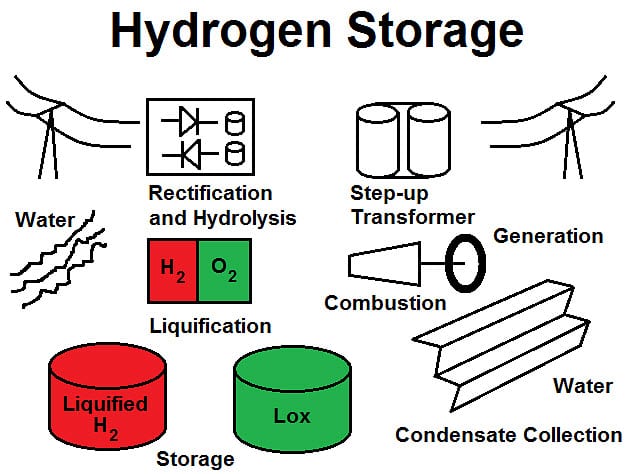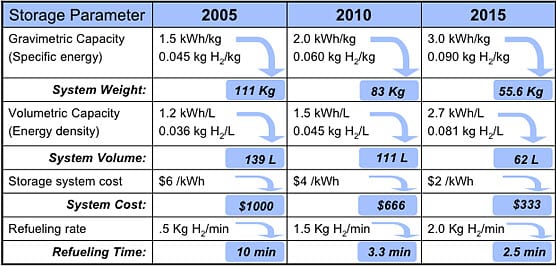Hydrogen is becoming more popular as a form of energy by the day.
As fuel for fuel cells, hydrogen can open up new potentials for energy production that dwarf fossil-fuels. As such, hydrogen has become a favored fuel of the auto industry, with many automakers looking to curb their environmental impact while still being able to produce vehicles with high performance. There are problems associated with hydrogen fuel, however, that could cripple its use in the near future.
Currently, efficient ways to store hydrogen fuel are few and far between…
Storing hydrogen is not a straightforward process, as the element itself is quite volatile. Hydrogen can be stored in three forms: Liquid, solid, or gas, each of which presents its own problems in terms of storage and energy potential. Already established technologies typically store hydrogen as a liquid or compressed gas. Many of these technologies are highly expensive, making them nonviable for some industries. Finding an efficient means of storage is a high priority for those in the fuel cell industry because it will help placate some of the concerns consumers have regarding this form of energy.
Another significant problem facing the use of hydrogen as a fuel is the lack of a sufficient infrastructure.
An infrastructure capable of supporting hydrogen fuel cells in some industrial projects is well established in some parts of the world. The problem lies, primarily, with transportation. As hydrogen becomes a more popular fuel for automakers, the lack of an infrastructure capable of supporting hydrogen-powered vehicles is becoming more apparent. Without a comprehensive fuel infrastructure, hydrogen transportation is not likely to become a success with consumers. Thus, the auto industry is mobilizing to address this issue.
In Europe, work is underway to build out a comprehensive hydrogen fuel infrastructure that connects many countries in the European Union. Similar efforts are underway in the U.S., but are primarily located in the western parts of the country. These efforts to establish a hydrogen fuel infrastructure are often called “Hydrogen Highways.”
In terms of storage, there is a great deal of research being done around the world aimed at finding a way to effective store hydrogen fuel. The Technical University of Denmark has been experimenting with ammonia, finding it to be a promising catalytic reformer and had succeeded in storing liquid hydrogen in an ammonia-salt tablet, a method that researchers claimed was safe and inexpensive. Other research efforts concerning storage largely revolve around the concept of chemical storage. The use of chemicals to absorb and hold hydrogen molecules could be an effective way to store the fuel without the need for costly technology.
Other Material and Images Related to The Process of Hydrogen Storage:
Example of Hydrogen Fuel Storage on a Utility level..

These are some targets projected for a hydrogen storage system *Wikipedia Image Source…

Targets Set between the USCAR and the US DOE


 With over 15 years of reporting hydrogen news, we are your premier source for the latest updates and insights in hydrogen and renewable energy.
With over 15 years of reporting hydrogen news, we are your premier source for the latest updates and insights in hydrogen and renewable energy.
I think that a development to use HO2 in cars is costly and ask a solution for many different technics because of the big securety items. Is a development to use HO2 in houses not better as a basic development and latter switch to cars?
Using HO2 in cars is extremely difficult, because there is no such thing as HO2.
Hydrogen for transport is often stored on-site where it is dispensed, in large tanks that store the gas at around 40 bar. When it is dispensed to the vehicle, special compressors increase the pressure to around 800 bar to deliver it to the vehicle where the pressure is reduced to 700 bar which cools down the hydrogen. The hydrogen can be produced at the station from wind, solar PV or from the grid using electrolysers during off-peak demand. In city centres where there is limited space, the hydrogen may be delivered by tanker from a production facility outside the city. Most hydrogen production in the UK is by hydroforming gas which yields CO2 and is therefore not “green”. Hydrogen powered cars are about double the price of an equivalent pure electric EV but have the advantage of being able to be refilled in a few minutes. A significant opportunity for hydrogen powered transport is for railways with several passenger services already running in other countries; this has the advantage of not requiring the expensive overhead electric catenaries often used to power trains; such equipment is expensive to maintain and is vulnerable to damage by bad weather and flying objects. In the UK hsydrogen powered trains are likely to replace diesel powered trains running on lines that have not been electrified.
Suggest proponents of H focus on storage in some form at wind and solar sites.
Put large fuel cells near storage tanks to generate electricity when needed.
Use high voltage DC lines as in China to move the energy into homes and cars.
ct
Sapiens will soon exhaust all coal, oil, methane and nuclear fuel resources. As each of these nonrenewable resources approach exhaustion, their price will skyrocket. Investing in the “forever fuel” economy is a better use of our capacity for change.
Intermittent renewables (hydro, solar, wind, tidal, wave) all involve the costs attached to energy storage that is capable of responding seamlessly during renewable energy intermittency shortages. The storage of hydrogen for this purpose also supports the sale of excess hydrogen for transportation fuel. We simply must find the best hydrogen storage solutions.
I like the idea of H02 for transport but can’t get over how blinded we are to the whole picture, how much plastics for example are we using in the manufacture of any vehicle, I know this is probably not the format for this conversation but food for thought.